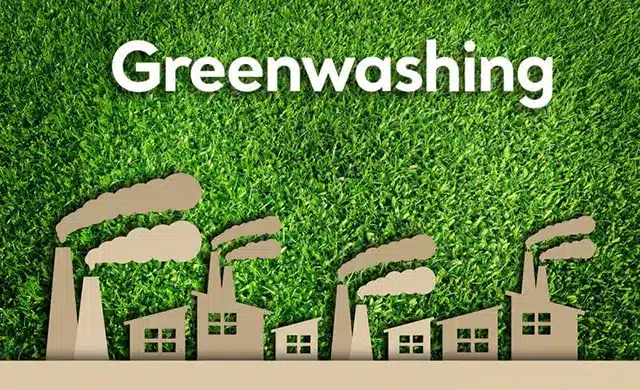
04 Nov Stop Greenwashing
In a world where environmental awareness is on the rise, more and more companies are adopting the development of more sustainable practices. However, not all companies are genuinely committed to the environment. Some resort to greenwashing, a deceptive tactic that seeks to present a “green” image without making real changes to their operations.
What is greenwashing?
Greenwashing is a practice in which some companies, through misleading or inaccurate claims, pretend to show a commitment to sustainability that is not real. The term, which arises from the words ‘green’ and ‘washing’, refers to a “greenwashing” of image, where unsustainable actions are hidden behind an ecological facade. This strategy seeks to capitalize on growing environmental awareness without a real commitment to sustainability, deceiving consumers.
Society must be able to identify these practices, since real ecological transition can only be achieved with companies that are truly committed to the environment. Genuine sustainability must be based on concrete facts, with verifiable measures and clear deadlines. Companies that engage in greenwashing not only harm the environment, but also destabilize public confidence, generating skepticism and undermining genuinely sustainable initiatives.
The difference between real sustainability and greenwashing
Companies that practice greenwashing tend to focus on superficial claims, highlighting only a minor aspect of their supply chain to give the appearance of sustainability while hiding more harmful practices. A typical example of this tactic is misleading labels and green logos, which create the illusion that a product is environmentally friendly without any real support in terms of environmental impact. These slogans or symbols can give the impression that the company is committed to sustainability, when in fact they lack verifiable substantiation.
In contrast, the commitments of truly sustainable companies are often accompanied by recognized certifications, such as the European Ecolabel or FSC© (FSC© C129717) and ISO 14001 certificates, which guarantee compliance with rigorous environmental standards. Genuine sustainability is not reduced to an isolated aspect of a company’s operation but is a comprehensive approach that encompasses all its areas. It involves the consistent implementation of sustainable practices, from the procurement of recycled or biodegradable raw materials to the reduction of carbon emissions throughout all of its operations. It also includes the incorporation of circular economy processes in waste management, ensuring that resources are reused rather than discarded.
Transparency as a key value for Rieusset
In line with the Gerosa Group’s global objectives for 2024, we at Rieusset continue to reinforce our commitment to sustainability and innovation, values we share as part of the group. This translates into clear initiatives to reduce our environmental impact and continuously improve our practices, following principles that ensure responsible and ethical resource management.
At Rieusset, sustainability and transparency are not trends – they are part of our fundamental pillars. Transparency in our actions has enabled us to obtain important recognitions, such as the Ecovadis Platinum rating, awarded to only the top 1% of companies in corporate social responsibility, and the FSCⓇ certification, which guarantees that materials and products bearing the FSCⓇ label come from responsibly managed forests and/or other controlled sources. We also have ISO 14001 certification, which endorses our environmental management through international standards that enable companies to demonstrate their commitment to environmental protection.
In our quest to be more sustainable, we have been calculating our carbon footprint for several years, initially covering scopes 1 and 2, which include direct emissions from our processes and energy consumption. Over time, we have partially incorporated scope 3, which refers to indirect emissions in waste management and water consumption. However, in 2024, we have decided to go a step further, expanding our assessment to include additional Scope 3 parameters, such as supplier transportation, employee commuting and business travel. This more comprehensive approach allows us to gain a global view of our CO₂ emissions, identifying further opportunities for reduction.
The incorporation of these new parameters not only reflects a greater commitment to accurately measuring our environmental impact, but also allows us to reinforce our strategies to reduce our greenhouse gas emissions.
Among our outstanding actions is the incorporation of timers that allow us to turn off the machines on weekends, avoiding unnecessary expenses when there is no activity. In addition, we have completed the transition to LED lighting throughout all our facilities, which has reduced electricity consumption for lighting by 70%. We have also conducted a thorough review of our compressed air installations, repairing leaks and establishing annual audits to monitor these losses and act quickly. These efforts are just a few examples of how we are acting proactively to reduce our environmental impact and work towards a more sustainable future.
How we collaborate with our clients against greenwashing
One of our main objectives is to help our customers avoid greenwashing and ensure that their products are genuinely sustainable. To achieve this, we have implemented Life Cycle Assessment (LCA) of our products, which allows us to identify critical points and propose improvement actions. This exhaustive analysis gives us a detailed view of the environmental impact of each product, allowing us to detect whether it truly meets sustainability criteria or if it could fall into greenwashing practices.
Through the LCA, we evaluate each stage of the life cycle of our customers’ labels, sleeves and flexible packaging, from the extraction of raw materials to their final disposal, identifying opportunities to reduce their environmental footprint and improve their sustainability. In this way, we can ensure that the products offered by us and used by our customers are aligned with a truly sustainable strategy.
In addition, we have begun to conduct recyclability analyses to accurately measure the degree to which the materials and products we use can be recycled. This approach ensures that our products are not only sustainable during their life cycle, but also have a positive impact at the end of their use.
Greenwashing represents a challenge for both consumers and companies committed to sustainability. At Rieusset, we work every day to be transparent in our actions and to offer packaging solutions that genuinely respect the environment. Our mission is not only to reduce our environmental impact, but also to help our customers avoid greenwashing through rigorous analyses and responsible practices. With each step that we take towards greater sustainability, we reaffirm our commitment to a greener and more responsible future.
| We Manufacture: | Meet Rieusset: |


